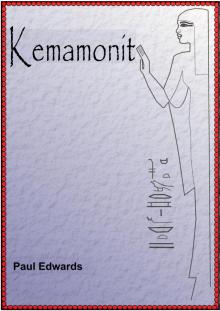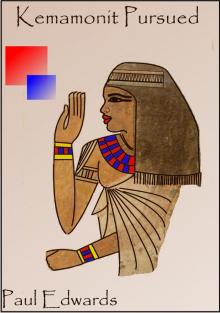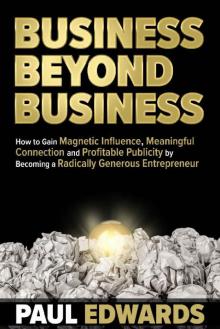- Home
- Paul Edwards
Business Beyond Business Page 4
Business Beyond Business Read online
Page 4
Punxsutawney Phil
Although Ned Ryerson remained a pusher throughout Groundhog Day, the main character, Phil Connors, became a magnet. Despairing of his long season re-living the same day over and again, Phil turned to improving himself. He learned the play the piano and ice sculpt. He became appreciative of beauty through poetry and music, helpful to his fellow man and gave the broadcast speech of his career in narrating the groundhog festivities.
In the final scenes, Phil’s magnetism took over the entire town of Punxsutawney. After a dazzling piano solo at the community hall, a parade of townspeople grateful for his good deeds interrupted throughout his dance with Rita, his love interest. You could sense her attraction and interest in him skyrocketing as the layers compound, to the point that she spent every single penny in her wallet to bid on him at the bachelor auction.
Phil got auctioned off to Rita, fell in true love with her, and they woke up to February 3rd. Self-effacing, self-sacrificing, generous and vivacious, Phil overcame his shallow, snobbish, self-centered beginnings. He discovered, as my old pastor Shane Rogers said, that “The meaning of life is a life that has meaning.”
That’s what it means to be a magnet instead of a pusher. You see people all around you as worthy of your time, attention and support, because they exist. You bestow upon them, as my mentor Morgan Snyder says, “The miracle of validation.” You develop a monastic heart that celebrates solitude, meditation, growth and appreciation for the world as it is. You become a natural leader with a servant’s heart, courageously endowing people around you with value and inspiring them to reach beyond their current state.
Be a magnet, then. Watch that account fill to overflowing. You’ll be amazed what happens.
CHAPTER 3
Golden
(Pro Bono Publicity)
My father always kept a copy of Dale Carnegie’s book How to Win Friends and Influence People in his library. I remember reading it for the first time as a teenager, fascinated with its insight into our condition. This quote always stuck with me: “We are interested in others when they are interested in us.”
Learning this lesson in face-to-face networking created a deep wellspring of opportunities. Understanding that our technological age enables us to do it globally is a game-changer. You can “scale” networking by showing genuine interest in people with a slightly more formal and private setting … and then create value for anyone and everyone with an internet connection or a smartphone who wants to watch or listen.
It took me years to understand this, but once I did, the dividends started racking up – and kept racking up.
Shameless Self-Promoter
Back in my radio days, I got the chance to chat with the then-program director (sorry to say I’ve forgotten his name) of KVI AM 570, while interning on the John Carlson Show. Our conversation was about the possibility of becoming a talk radio host. This was during the rise of Glenn Beck, and my friend (the program director) told me something about Beck that stuck with me: “He’s a shameless self-promoter.”
Years later, I was trying to think of a new Facebook post for the day. That phrase came back to me. But this time, I had a matching photo – a candid professional still taken during a shoot with my friend Brian Pettepiece. It was me sitting at a desk, talking excitedly on my cell phone. I had just the right cheesy expression, captured in the middle of an uproarious laugh. The caption matched perfectly with big, bold white letters like the ones used in contemporary memes: “Shameless Self-Promoter.”
My audience loved it. They knew I was making fun of myself. By this point, my marketing was more other-centric. I still made use of a charismatic connection with people, using a tongue-in-cheek swagger they found endearing and entertaining. Little did they know, I was a recovering used car salesman.
The truth is we don’t have to look or sound like the sleazy car peddler Simon in the movie True Lies, to be used car salesmen. The problem with stereotypical used car salesmen is they’re broke and desperate for money. To compound the dysfunction, their average customer is usually broke and desperate for money. Having personally been the broke, desperate, unemployed youth on a lemon lot signing paperwork to enlist as a debt slave, I know that these salespeople work in the spiritual equivalent of a black hole. Sadly, there are many sales occupations with only slightly better pay scales for broke, desperate people.
I could be every bit the used car salesman, even if I was better dressed, clean-cut and more articulate in my speech. The problem we really have with this caricature is his mentality, not his external cheesiness. But I digress.
Used correctly, publicity is a powerful tool. Many of the people in the Business Beyond Business Mastermind are powerful, influential people you’ve never heard of. They understand publicity is best exercised on behalf of relationships they seek to build. The worldly culture has this backwards; they think it’s a shallow method of glorifying and hyping people beyond their ability to perform. That might be true for the celebrities being amplified, but for the ones doing the publicizing, it’s an extremely valuable skill set.
If you want to see a real-life story of how this converted to success, I recommend Omar Elattar’s channel, “The Passionate Few.” Motivated by a break-up with a girlfriend who was obsessed with Grant Cardone, Omar went on a mission to get an interview with Cardone. He landed it, which he used to parlay into his own interview channel. That led to interviews with billionaires and mega-influential executives, and Omar now coaches people on replicating his success at $10,000 a pop.
I didn’t understand any of this when I started my first podcast in 2010. Drawn to the celebrity and influence wielded by men like Rush Limbaugh and Sean Hannity, I started imitating their format and on-air antics. I became well-versed in conservative ideology, and I have a good radio voice. But I had no clue how to find good guests or sponsors. I didn’t know how to get my content in front of program directors. It never occurred to me to network. I had vague hopes someone on the internet would find my show and then share it with someone looking for new radio or podcast talent.
The proliferation of content around “one person’s opinion” has changed. People still want to hear expert opinions from professionals and influencers, but the traditional marketplace lost its power to curate them when the internet came along. That presents a new problem: how to persuade complete strangers of your expertise, mainly through cyberspace – while thousands of other voices are competing for it.
Radically Generous Entrepreneurs prove an exception to this trend, because they know who they serve. As my friend Luis Diaz pointed out, top podcasters like Tim Ferriss and John Lee Dumas “over-delivered like crazy” long before anyone knew their names. They created significant value for people by drilling deep to identify specific client avatars. The theory, since proven, is once you know that ideal client well, it becomes very simple to meet or exceed their expectations. Naturally, this led to high demand for both guests and sponsors on their shows, for which they now are free to charge confiscatory rates. Prior to that, however, they did it for free.
When you meet a Radically Generous Entrepreneur like my friend Jill Davis of Alaska Woman Consulting, you’ll notice she cares more about over-delivering on her content to her audience than multiplying audience members. That’s why she invited me, despite my miniscule audience, to participate in her 2019 “Calling All Rockstar Entrepreneurs” event, when she normally searches for influencers with lists in excess of 5000 people.
He Doesn’t Know … But He Knows a Man Who Does
In 2017, I resurrected my old podcast, “The Knightly Show with Paul Edwards.” It was fun to be back behind the microphone, but I soon realized no one was listening. It wasn’t long before Vince Del Monte pointed out that my podcast had nothing to do with my book. It was time to scrap “The Knightly Show” for a title that was analogous to what I was pitching.
You’d think I’d have learned my lesson, but I went on to consult myself and no one else (again) and renamed it “The Golden Ru
le Marketing Podcast.” This made things worse. It was as vague to everyone (except me) as the previous title. It also didn’t sync with the name or nature of my book. Vince nuked this during one of our mastermind meetings. He told me to call it “Influencer Networking Secrets.”
Also obvious to everyone but me: nobody knew who I was. I was uploading content to YouTube and LibSyn, still in a fog about why nobody watched or listened. Vague recordings about vague concepts by a vague figure offered to vague customers in a vague hope of a vague idea of success on glutted content platforms, ten years after the prime time to become dominant on them had passed.
It took a spell to figure out there had to be a different strategy for my personal media platform. Eventually, I saw in it the symbol of what made me strong during in insurance – I was strong because of who knew me. I was strong because of my relationship to God and the goodwill accounts I’d filled with clients, referral partners and associates. An interview platform, under such auspices, was perfect to continue playing that game at a higher level. Views, likes, comments and shares got set aside as performance targets.
Thus, I maintain my strength comes mainly through who knows me. Instead of trying to control the marketplace and get them to do what they never will, I focus on crafting questions and conversations that affect and impress the guests. Why? Because, as Jayson Gaignard said, “Amazing people get more amazing with time, and amazing people tend to know other amazing people.”
You can either be an expert at something and add value through your knowledge, or you can add value through your honesty by admitting you’re not an expert. I realized my strength was in not being an expert. If I had “expertise” at all, it was in making friendships with experts. Most of the time, I’m sorry to say that I don’t know the answers … but most of the time, I’m glad to say, I know someone who does.
Despite all this failure, you can’t lose by creating your own interview show, even if you suck at it. That’s not because you’re an undiscovered ratings star; quite the opposite. Whether or not your occupation lends itself to doing this, interviewing is one of the best ways to make friendships and allegiances with people – especially if they’re on the trajectory of becoming powerful and influential. These conversations usually bring about a deeper connection between the host and the guest … but they also bring listeners into that connection.
Luis Diaz
Luis and I became fast friends through Vince Del Monte. He owns Podcast Domination, a concierge service for podcasters. Outgoing and generous, Luis brings massive knowledge about the power of audio to “scale intimacy,” which is critical for any expert, coach or service-oriented entrepreneur.
During his interview, Luis gave a very practical set of questions from Andy Stanley to use for recording an interview. If you can remember them when you’re interacting with someone, you’ll become worth your weight in gold.
1.What does the listener need to know at the end of this conversation?
2.Why do they need to know this? Why is it important?
3.What do they need to do at the end of the conversation?
4.Why do they need to do it? What are the consequences if they don’t?
5.How can I help them remember this?
When I used these to reverse-engineer interviews, I realized Mr. Stanley had codified the structure of some successful, meaningful and productive face-to-face conversations I’d had. Luis was now using the same method I’d already stumbled on when paired with the right person in networking.
Vegas Odds
One such example: Cameron Wilson, a commercial real estate agent with the Rants Group in Olympia. In 2015, he relocated from a decade in business in Las Vegas, a drastically different commercial market. Our mutual friend Martha Wagner introduced us. When he joined my poker game, we nicknamed him “Vegas.”
The best part of our conversation was helping Cam orient himself to the business culture in Olympia. He was shocked by the casual reticence and zero-sum communication he’d experienced while getting his feet wet. I told him what I’d learned; there simply isn’t much mileage in cold calls and transactional marketing here. You either take time to get to know people and exchange value or make phone calls to people who don’t pick up so you can leave voicemails they don’t listen to.
I convinced Cam to “circulate” through the business community. It became a fantastic source of recurring and expanding business. By 2017, he’d taken up public speaking, touring from one civic club to the next to promote the renewal of downtown Olympia through several projects, including those of his competitors. Embracing the network culture paid off. It established him as a commercial real estate powerhouse.
This conversation answered almost all those questions Luis provided. Cam knew:
• His most important task
• Why he needed to know it
• What he needed to do as a result
• Why he needed to do it
• The consequences if he didn’t do it
Remember the Context
Because we’d just met, I emphasized tactics to Cameron. Luckily, he turned out to be a kindred soul with a long-range mindset. Bear in mind as you read this, people are imitators of the first order. In many cases, if you give a practical tip without a philosophical underpinning or the context in which it’s used, you’ll end up with snarky feedback from frustrated listeners who went out and imitated your tactics. If they backfire, they won’t blame themselves.
My mentors John Eldredge and Morgan Snyder discussed this on the Ransomed Heart Podcast. They minister to Christian men. They make heavy use of analogies from traditional masculine activities like hunting, fishing, sports and rock climbing to engage their audience.
Over time, they observed the lifestyle they lived wasn’t necessarily replicable for men in certain stages or circumstances of life. Listeners with physical handicaps, limited means, consuming family responsibilities or adverse circumstances like divorce, death or incarceration couldn’t ride horseback into the mountains to refresh their souls. On one such episode, they acknowledged this by encouraging men to differentiate between the mythic and specific aspects of calling. For me, this meant relinquishing my specific dream of being a radio talk show host without scuttling my mythic calling of “Communicator.”
In other words, it’s important to avoid precluding people. Morgan said, “A lot of people latch onto a particular activity, or style we have of doing something, and the first thing they do is rush out and try to replicate it without any background or context. When it doesn’t work the way they hope, they get frustrated and write to us in anger or disillusionment. That couldn’t be further from what we’re after in sharing what we do.”
Such is the spiritually hollow era in which we live, but it’s also a wise defensive posture against being misinterpreted and dismissed. The same principle holds true if you endeavor to interview people – you want to review a guest’s practical (how they do what they do), usually after you have discussed the philosophical (why they do it).
I’m all for the discussion of tactics, if they’re helpful in illustrating a point. Entrepreneurs are on the hunt for results, however, so let’s not kid ourselves. Our audience is typically comprised of “Type A” personalities with control-freak tendencies. If you’re not careful, you can end up over-promising and under-delivering, and it won’t take long for word to spread.
The Secrets of Interviewing Influencers
There could be confusion from the title of “Influencer Networking Secrets,” my interview show. You can interpret it as “the secrets of networking with influencers,” or as “the secrets of how influencers network.” But the two are parts of the same overall sequence, and the interviews are meant to demonstrate that.
As I kept interviewing, the combination of what I learned from Luis and other great podcasters – John Eldredge and Ransomed Heart, And Sons, Become Good Soil, The Empire Podcast and Seth Godin’s “Akimbo” – helped me improve. My structure and organization, prepara
tion and attention to detail and research skills got better with each pass. My guests became more varied and diverse, and the numbers began to catch up.
The questions eventually dug deeper. You go from asking a guest, “How do you do X, Y, Z?” to “What motivated you to create this approach?” Sometimes you restate the question if the guest doesn’t pick up right away on where you’re going with it. I always seemed to find the richest and most nourishing elements of the conversation when we discussed their background. You begin to see the contextual “well” from which they draw inspiration or energy.
In early 2019, I interviewed Summer Peterson, author of The Sexy Diet, which finished the previous year as an Amazon bestseller. Though barely acquainted, we had a fantastic discussion leaning into the psychology and mental dexterity required to change your eating habits and achieve the physique you desire. It was a summit of the first order. Both masculine and feminine perspectives found common ground to add merit to the proper approach to weight loss.
Around that time, I also had a terrific conversation with Daryl Murrow, a friend and mentor in Olympia. We talked about his journey as an entrepreneur from anxiety attacks to business breakthroughs. His casual vulnerability and radical accountability for self-imposed isolation, anger and bitterness are exactly what today’s entrepreneurs need to hear.
Do you see how understanding and relating to the subconscious, unspoken motivations and fears of your fellow human beings holds so much power? As you’ll read in a later chapter, copywriting makes extensive use of the same strategy. Speak with empathy to what is going on behind the listener’s well-constructed façade, for that is where decisions are most heavily influenced, if not automatically made. As Jesus told us in Mark 4:22, “Whatever is hidden is meant to be disclosed, and whatever’s concealed is meant to be brought out in the open.”

 Kemamonit Returns
Kemamonit Returns Kemamonit
Kemamonit The Hound of Kemamonit
The Hound of Kemamonit Its All Wormholes Now
Its All Wormholes Now Kemamonit Undercover
Kemamonit Undercover Kemamonit Pursued
Kemamonit Pursued Kemamonits Library
Kemamonits Library The Poisonous Biscuit
The Poisonous Biscuit Business Beyond Business
Business Beyond Business